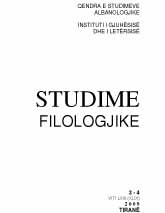Pjesorja e shqipes në vështrim diakronik
Albanian participle from a diachronic perspective
Author(s): Kolec TopalliSubject(s): Language and Literature Studies
Published by: Qendra e Studimeve Albanologjike
Keywords: Albanian participle ;diachronic perspective; Albania ; Albanian Philology ;
Summary/Abstract: The participle has a twofold nature: verbal and nominal or adjectival, i. e. it partly pertains to the verbal system and partly to the nominal system. This explains the fact that in the old languages it has had endings according to gender and number and was conjugated just as the nouns and adjectives (cf. Lat. status ~ stata ~ statum). Albanian has only one participle, which pertains to the past and generally has a passive character, but in distinction from other languages, it is presented in numerous and various forms, some of which are inherited from the Indo-European, whereas some others have been formed in the inner development by the attach of the suffixes of this form. But the Albanian participle has lost the grammatical categories of gender and number being presented only in verbal characteristics; consequently, it cannot express grammatical categories that are typical of the nominal-adjectival system. At this point the Albanian participle comes close to the German one (cf. er ist gekommen ~ sie ist gekommen ~ sie sind gekommen) and moves away from the participles of Roman languages, which express the category of gender and number (cf. It. venuto ~ venuta ~ venuti ~ venute).The participle has a twofold nature: verbal and nominal or adjectival, i. e. it partly pertains to the verbal system and partly to the nominal system. This explains the fact that in the old languages it has had endings according to gender and number and was conjugated just as the nouns and adjectives (cf. Lat. status ~ stata ~ statum). Albanian has only one participle, which pertains to the past and generally has a passive character, but in distinction from other languages, it is presented in numerous and various forms, some of which are inherited from the Indo-European, whereas some others have been formed in the inner development by the attach of the suffixes of this form. But the Albanian participle has lost the grammatical categories of gender and number being presented only in verbal characteristics; consequently, it cannot express grammatical categories that are typical of the nominal-adjectival system. At this point the Albanian participle comes close to the German one (cf. er ist gekommen ~ sie ist gekommen ~ sie sind gekommen) and moves away from the participles of Roman languages, which express the category of gender and number (cf. It. venuto ~ venuta ~ venuti ~ venute). The themes of the participle form, with some exceptions, are the same as those of the simple past, and this is natural since the Albanian participle is a past participle, and its temporal meaning accords with that of the simple past. Furthermore, the relations between these two forms are reciprocal, since in some cases even the participle has served as a theme for the simple past. But some verbs have a different theme from the simple past, being distinct especially in the stressed vowel, for e. g.: mbjellë ~ mbolla, tjerrë ~ tora, marrë ~ mora, dalë ~ dola, ardhë ~ erdha, dashtë ~desha etc.
Journal: Studime Filologjike
- Issue Year: 2009
- Issue No: 03-04
- Page Range: 005-031
- Page Count: 27
- Language: Albanian
- Content File-PDF

